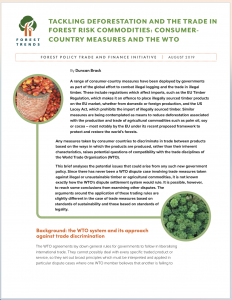Tackling Deforestation and the Trade In Forest Risk Commodities: Consumer-Country Measures and the WTO
By Duncan Brack View PublicationA range of consumer-country measures have been deployed by governments as part of the global effort to combat illegal logging and the trade in illegal timber. These include regulations which affect imports, such as the EU Timber Regulation, which makes it an offence to place illegally sourced timber products on the EU market, whether from domestic or foreign production, and the US Lacey Act, which prohibits the import of illegally sourced timber. Similar measures are being contemplated as means to reduce deforestation associated with the production and trade of agricultural commodities such as palm oil, soy or cocoa – most notably by the EU under its recent proposed framework to protect and restore the world’s forests.
Any measures taken by consumer countries to discriminate in trade between products based on the ways in which the products are produced, rather than their inherent characteristics, raises potential questions of compatibility with the trade disciplines of the World Trade Organisation (WTO).
This brief analyses the potential issues that could arise from any such new government policy. Since there has never been a WTO dispute case involving trade measures taken against illegal or unsustainable timber or agricultural commodities, it is not known exactly how the WTO’s dispute settlement system would rule. It is possible, however, to reach some conclusions from examining other disputes. The arguments around the application of these trading rules are slightly different in the case of trade measures based on standards of sustainability and those based on standards of legality.

